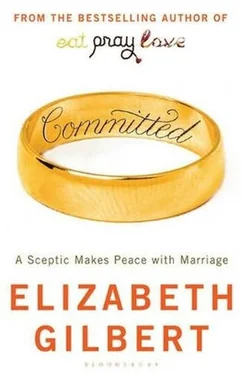But the early Christian visionaries weren’t interested in making Christians in the biological sense (as infants who came from the womb); instead, they were interested in converting Christians in the intellectual sense (as adults who came to salvation through individual choice). Christianity wasn’t something you had to be born into; Christianity was something that you selected as an adult, through the grace and sacrament of baptism. Since there would always be more potential Christians to convert, there was no need for anybody to sully himself by generating new babies through vile sexual congress. And if there was no need anymore for babies, then it naturally stood to reason that there was no need anymore for marriage.
Remember, too, that Christianity was an apocalyptic religion-even more so at the beginning of its history than now. Early Christians were expecting the End of Days to arrive at any moment, perhaps as early as tomorrow afternoon, so they were not especially interested in launching future dynasties. Effectively, the future did not exist for these people. With Armageddon both inevitable and imminent, the newly baptized Christian convert had only one task in life: to prepare himself for the upcoming apocalypse by making himself as pure as humanly possible.
Marriage = wife = sex = sin = impurity.
Therefore: Don’t marry.
When we speak today, then, about “holy wedded matrimony,” or the “sanctity of marriage,” we would do well to remember that, for approximately ten centuries, Christianity itself did not see marriage as being either holy or sanctified. Marriage was certainly not modeled as the ideal state of moral being. On the contrary, the early Christian fathers regarded the habit of marriage as a somewhat repugnant worldly affair that had everything to do with sex and females and taxes and property, and nothing whatsoever to do with higher concerns of divinity.
So when modern-day religious conservatives wax nostalgic about how marriage is a sacred tradition that reaches back into history for thousands of uninterrupted years, they are absolutely correct, but in only one respect-only if they happen to be talking about Judaism. Christianity simply does not share that deep and consistent historical reverence toward matrimony. Lately it has, yes-but not originally. For the first thousand or so years of Christian history, the church regarded monogamous marriage as marginally less wicked than flat-out whoring-but only very marginally. Saint Jerome even went so far as to rank human holiness on a 1-to-100 scale, with virgins scoring a perfect 100, newly celibate widows and widowers ranking somewhere around 60, and married couples earning the surprisingly unclean score of 30. It was a helpful scale, but even Jerome himself admitted that these sorts of comparisons had their limits. Strictly speaking, he wrote, one should not even rightly compare virginity to marriage-because you cannot “make a comparison between two things if one is good and the other evil.”
Whenever I read a line like this (and you can find such pronouncements all over early Christian history), I think of my friends and relatives who identify themselves as Christian, and who-despite having strived with all their might to lead blameless lives-often end up getting divorced anyhow. I have watched over the years as these good and ethical people then proceed to absolutely eviscerate themselves with guilt, certain that they have violated the holiest and most ancient of all Christian precepts by not upholding their wedding vows. I myself fell into this trap when I got divorced, and I wasn’t even raised in a fundamentalist household. (My parents were moderate Christians at best, and none of my relatives laid any guilt on me when I was divorcing.) Even so, as my marriage collapsed, I lost more nights of sleep than I care to remember, struggling over the question of whether God would ever forgive me for having left my husband. And for a good long while after my divorce, I remained haunted by the nagging sense that I had not merely failed but had also somehow sinned.
Such currents of shame run deep and cannot be undone overnight, but I submit that it might have been useful for me, during those months of fevered moral torment, to have known a thing or two about the hostility with which Christianity actually regarded marriage for many centuries. “Give over thy stinking family duties!” instructed one English rector, as late as the sixteenth century, in a spittle-flecked denunciation of what we might today call family values. “For under all there lies snapping, snarling, biting, horrid hypocrisy, envy, malice, evil surmising!”
Or consider Saint Paul himself, who wrote in his famous letter to the Corinthians, “It is not good for a man to touch a woman.” Never, ever, under any circumstances, Saint Paul believed, was it good for a man to touch a woman-not even his own wife. If Paul had his way, as he himself readily admitted, all Christians would be celibates like him. (”I would that all men were even as I myself.”) But he was rational enough to realize that this was a tall order. What he asked for instead, then, was that Christians engage in as little marriage as humanly possible. He instructed those who were unmarried never to marry, and asked those who were widowed or divorced to abstain from settling down in the future with another partner. (”Art thou loosed from a wife? Seek not a wife.”) In every possible instance, Paul begged Christians to restrain themselves, to contain their carnal yearnings, to live solitary and sexless lives, on earth as it is in heaven.
“But if they cannot contain,” Paul finally conceded, then “let them marry; for it is better to marry than to burn.”
Which is perhaps the most begrudging endorsement of matrimony in human history. Although it does remind me of the agreement that Felipe and I had recently reached-namely, that it is better to marry than to be deported.
None of this meant that people stopped getting married, of course. With the exception of the very most devout among them, early Christians rejected the call to celibacy in resounding numbers, continuing to have sex with each other and to get married (often in that order) without any supervision whatsoever from priests. All across the Western world, in the centuries following Christ’s death, couples sealed their unions in various improvisational styles (blending together Jewish, Greek, Roman, and Franco-Germanic matrimonial influences) and then registered themselves in village or city documents as being “married.” Sometimes these couples failed at their marriages, too, and filed for divorce in the surprisingly permissive early European courts. (Women in Wales in the tenth century, for instance, had more rights to divorce and family assets than women in Puritan America would have seven centuries later.) Often these couples remarried new spouses, and argued later over who had rights to furniture, farmland, or children.
Matrimony became a purely civil convention in early European history because, by this point in the game, marriage had evolved into an entirely new shape. Now that people lived in cities and villages rather than fighting for survival in the open desert, marriage was no longer needed as a fundamental personal safety strategy or as a tool of tribal clan building. Instead, marriage was now regarded as a highly efficient form of wealth management and social order, requiring some sort of organizing structure from the larger community.
At a time when banks and laws and governments were still enormously unstable, marriage became the single most important business arrangement most people would ever make in their lives. (Still is, some might argue. Even today, very few people have the power to influence your financial standing-for better or worse-quite so deeply as your spouse.) But marriage in the Middle Ages was certainly the safest and smoothest means of passing wealth, livestock, heirs, or property from one generation to the next. Great wealthy families stabilized their fortunes through marriages much the same way that great multinational corporations today stabilize their fortunes through careful mergers and acquisitions. (Great wealthy families back then essentially were great multinational corporations.) Wealthy European children with titles or inheritance became chattel, to be traded and manipulated like investment stocks. Not just the girls, mind you, but the boys, too. A child of rank could find himself engaged and then unengaged to seven or eight potential wives before he reached the age of puberty and all the families and their lawyers reached a final decision.
Читать дальше












